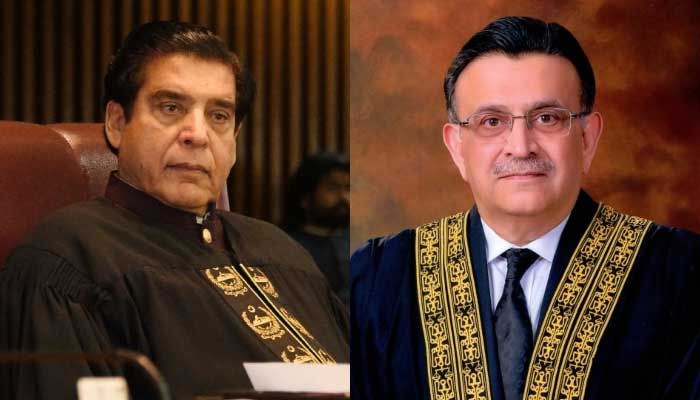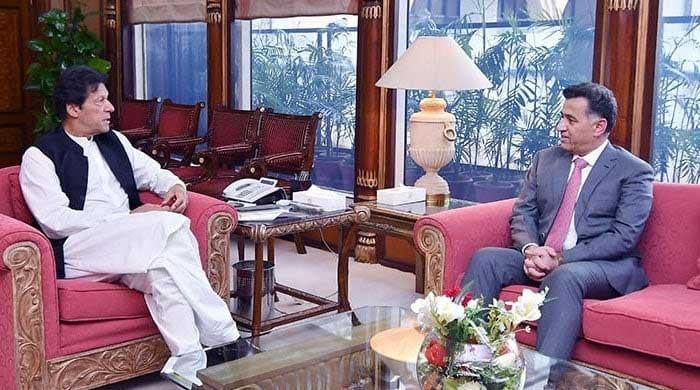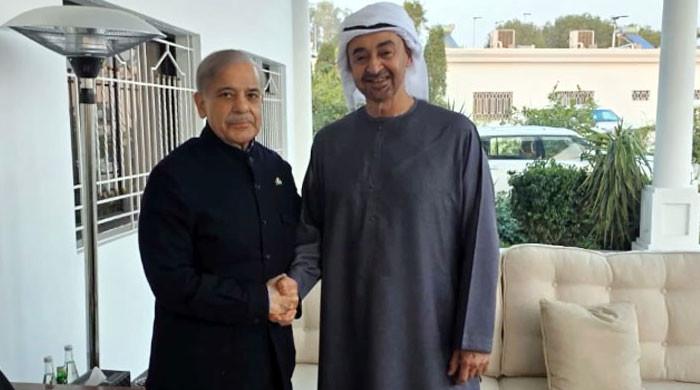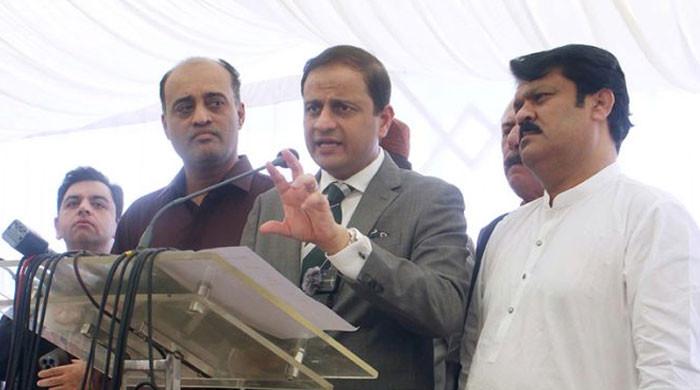NA speaker urges Supreme Court judges to ‘avoid involvement in political thicket’
Raja Pervaiz Ashraf raises lawmakers' concerns about SC's encroachment upon power to approve expenditure from Federal Consolidated Fund
April 26, 2023

- "We must work together to uphold Constitution," speaker writes.
- Letter to CJP Bandial mentions court's encroachment on NA's powers.
- Ashraf highlights powers vested in Article 73, 79 to 85 in letter.
In a letter addressed to the Supreme Court's Chief Justice Umar Ata Bandial, Speaker of the National Assembly Raja Pervaiz Ashraf Wednesday wrote that the country's top court must "avoid getting involved in political thicket", as far as possible.
The speaker wrote the letter to the country's top judge regarding the court's encroachment upon the National Assembly's power to approve expenditures from the Federal Consolidated Fund.
The development comes as the government and the Supreme Court remain at loggerheads over the elections to the Punjab and Khyber Pakhtunkhwa assemblies.
The apex court — which will resume hearing on elections tomorrow (Thursday) — had before Eid ul Fitr asked parties to sit down at the negotiating table to decide a day for the elections, but that hasn't happened yet.
In a meeting of the ruling allies earlier today, Prime Minister Shehbaz Sharif said that a parliamentary committee would discuss the terms of talks between the ruling alliance and the Pakistan Tehreek-e-Insaf (PTI) regarding holding elections across the country on the same day.
But the lawmakers of the ruling alliance, in their fiery speeches today, rejected to hold talks with the opposition under duress and expressed confidence in the leadership of PM Shehbaz.
"It is best to leave resolution of political matters by parliament and the political parties," the speaker of the lower house wrote.
In his letter, Speaker Ashraf urged the apex court's top judge and other judges as well to individually and collectively exercise restraint and respect the legislative domain of the Parliament.
"We must work together to uphold the Constitution, protect the democratic values and work within our respective constitutional domains to ensure that confrontation between the organs of the state is avoided and the constitutional order is maintained," he stated.
He further wrote about conveying "profound concern and unease of the elected representatives of the people of Pakistan regarding some recent decisions of the Supreme Court and comments made by some Hon’ble Judges, as reported in media."
He added that those decisions amount to encroachment upon two core constitutional functions of the National Assembly — law-making and power of the purse.
The speaker also highlighted that the Article 73 of the Consitution vests powers related to the Money Bill exclusively in the National Assembly, while Articles 79 to 85 confer power and authority to approve expenditure from the Federal Consolidated Fund on the elected members of the National Assembly.
"Keeping in view these unambiguous constitutional provisions and division of powers and functions, I write to convey the profound concern and deep unease of the National Assembly with the orders passed by a 3-member Bench of the Supreme Court, on 14-04-2023 and 19-04-2023, directing the State Bank of Pakistan and Finance Division, Government of Pakistan to allocate/release Rs. 21 billion two the Election Commission of Pakistan," he wrote.
Speaker Ashraf, who is also a senior Pakistan Peoples Party politician, added that these orders have been passed notwithstanding that such release has expressly been forbidden by the National Assembly.
In doing so, he said, the three-member Supreme Court bench has ignored the following:
(i) Resolution of the National Assembly dated 06-04-2023 resolving that the decision, in SMC No. 1/2023 and CPs No. 1 and 2 of 2023 passed by a majority of 4-3, had dismissed the SMC and CPs. Thus, CP No. 05/2023 was not maintainable and as such, the decision dated 04-04-2023 has no force of law or has any binding effect;
(ii) On 10-04-2023, the National Assembly refused to pass the Charged Sums for General Elections (Provincial Assemblies of the Punjab and the Khyber Pakhtunkhwa) Bill, 2023, whereunder a charge was sought to be created on the Federal Consolidated Fund for Rs21 billion, under Article 81(e) of the Constitution;
(iii) On 17-04-2023, die Standing Committee on Finance and Revenve of the National Assembly, directed the Finance Division to seek prior approval of the National Assembly, in order to avoid constitutional violation for this unauthorised expenditure, because the National Assembly would have rejected ex-post facto approval for Rs21 billion demand for supplementary grant as ether expenditure, keeping in view the foregoing position of the National Assembly.
"It is sadly noted that the 3-member Bench’s orders have completely disregarded the constitutional process and the prerogative of the National Assembly with respect to financial matters," he wrote.
He added that the bench seemed to be in a hurry giving unusual directions to the Federal Government to authorise the expenditure of Rs21 billion from the Federal Consolidated Fund and then present it as fait accompli to the National Assembly.
The ex-post facto rejection of this amount by the lower house, which will most certainly happen, would make this authorisation, albeit on court orders, unconstitutional and will surely lead to untoward consequences for the federal government, the letter read.
"The National Assembly notes with great concern that despite knowing the consequences and effects of such prior authorisation, which will be rejected by the National Assembly when presented for ex-post facto approval, the 3-member Bench of the Supreme Court has threatened the Federal Government of ‘setious consequences’ for not authorising the expenditure of Rs21 billion," the speaker mentioned.
SC latest verdict 'shocking'
Foreign Minister Bilawal Bhutto-Zardari, in his address to the lower house earlier today, said despite court orders, Punjab local body elections did not take place and even after the passage of 90 days, the date for Khyber Pakhtunkhwa polls was not decided yet.
He termed as "shocking" the Supreme Court's latest verdict, in which it directed the State Bank of Pakistan (SBP) to issue funds for polls in Punjab and KP and later take approval from parliament.
"The parliament is being insulted because of a few people's stubbornness. If the judiciary has any misunderstanding regarding the Constitution, the PPP and the parliamentary committee are present to help it understand."
He questioned how the SC could order that the parliament be ignored. "Despite judges' 'thoughts', we respect them," he stressed.
'Anarchy'
In his address, Finance Minister Ishaq Dar came down hard on PTI Chairman Imran Khan and said the two assemblies were dissolved to spread "anarchy" in the country.
He said that the Election Commission of Pakistan's (ECP) request for the release of funds was sent to the finance ministry, but his ministry cannot allow the issuance of funds without the following "procedures".
The minister added that in line with the law, the government brought the request before the cabinet and the parliament — both of whom rejected the proposal.
Dar said that the parliament accepts the 4-3 decision of the Supreme Court and noted that even the State Bank of Pakistan cannot release the funds — despite the top court's order.
He said that in the Punjab Assembly case, Article 63-A of the Constitution was re-written and the "world is surprised over the new interpretation" of the article.
"What was the sin of the 25 members whose vote was not counted?" he asked, claiming that the decision was made to spread anarchy in the nation.
Dar then slammed the "elements" responsible for derailing Pakistan's economy and said the country was standing at a "critical juncture".
The finance minister asked what would happen if the elections are held after three to four months. "What will happen if the elections happen in the country in October?"
The minister said the government was being asked to do an "illegal" thing and he would never advise the cabinet to do so. He added that the law dictates that elections should be held simultaneously.
"We cannot go against the Constitution just on court orders," he said, asking the parliament's members to suggest what the government should do till tomorrow.
'Parliament's prerogative'
In his speech on the floor of the National Assembly, Law Minister Azam Nazeer Tarar said the lower house of the parliament has already passed resolutions for not providing funds to the election commission for polls.
"When the matter was taken up before the cabinet, the house had already issued its decision," the law minister said, stressing that it is the parliament's prerogative on the issuance of funds.
The minister added that the parliament had directed the federal government not to follow up on the Supreme Court's "minority" decision on the elections.
"Releasing funds from the Federal Consolidated Fund is the parliament's prerogative," the law minister added.
The minister said a person dissolved the assemblies to satisfy his "ego". He added that given the current circumstances, the parliament has the power to either ratify or review its earlier decisions.









